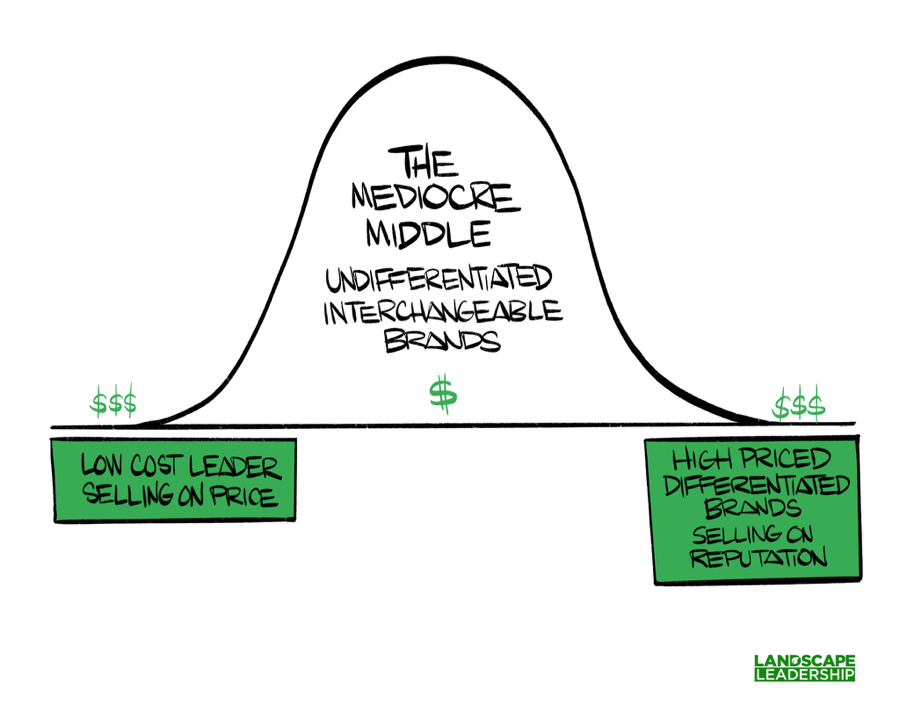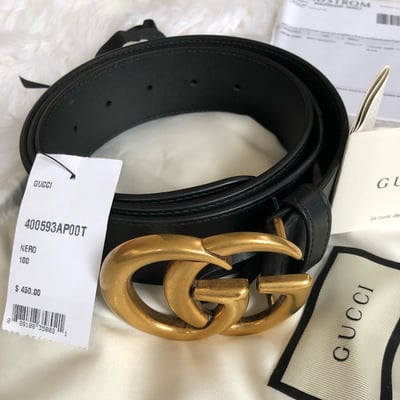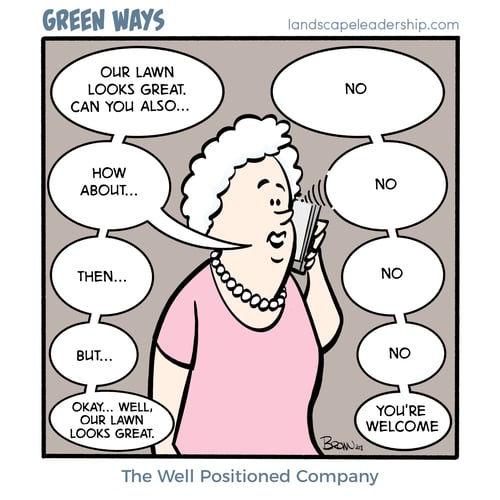Topics: Sales Branding And Positioning Growth
How the Perception of EXCLUSIVITY Can Make You More Money
 Author: Chris Heiler
Author: Chris Heiler
I've written extensively about being Just Another Landscaper and the concept of the Mediocre Middle, where undifferentiated firms battle it out for the thinnest of margins.
Contrast this with the most successful companies who thrive on the outer edges of the bell curve, turning a substantial profit year after year.

Read this article for a refresher.
In this post I will discuss the concept of "exclusivity", especially as it relates to moving up-market – away from the Mediocre Middle – as you service a more affluent clientele.
Business is booming. Kinda.
In our current economy I'm seeing lawn and landscape companies across the country, perhaps just like you, who are busier than ever. Adding new customers doesn't seem to be a problem.
Before we hold hands and sing Kumbaya, let my cynical self throw some cold water on you:
The majority of companies who fail (and most do!) don't fail due to lack of sales. In fact, in many cases increased sales is a precursor to failure.
Business is a game of margins, not a game of volume.1 Companies fail because of thin margins (gross and net).
Successful companies are profitable companies. And, the most profitable companies are those who are highly differentiated from their competitors.
Differentiation and exclusivity go hand in hand.
(RELATED READING: What Makes You So Unique?)
Why exclusivity is important
Here's how Oxford defines "exclusive":
1. Excluding or not admitting other things.
"My exclusive focus is on San Antonio issues."
2. Restricted or limited to the person, group, or area concerned.
"The couple had exclusive possession of the condo."
At the most basic level creating exclusivity in your business means limiting one, or a combination, of the following:
- Who you work with
- What services you offer
- Where you offer services
If limiting yourself carries a negative connotation in your mind then I recommend reading this article.
We'll get to how to create the perception of exclusivity in a moment, but first, let's talk about why it is so important. Here are three practical reasons to care:
1. Pricing leverage
 Exclusivity comes with a higher price tag. Wander through your local high-end shopping mall for proof. You might see the now iconic Gucci Cintura Donna Leather Belt, with its signature double-G hardware, priced at $460 at Nordstrom. Yeah, a belt.
Exclusivity comes with a higher price tag. Wander through your local high-end shopping mall for proof. You might see the now iconic Gucci Cintura Donna Leather Belt, with its signature double-G hardware, priced at $460 at Nordstrom. Yeah, a belt.
I realize you are not Gucci, but the same principles apply.
By definition, setting a high price that is unattainable for a segment of potential customers excludes them from doing business with you.
Higher prices should equate to higher margins (unless, of course, you run a real shit show for operations in which case your high prices won't save you).
2. Word of mouth
"We ate at Le Bernadin (NYC) last night."
"He golfed at Augusta last weekend."
"It's Gucci."
Word of mouth travels faster the more exclusive you are perceived to be. And, it travels through the right people.
Often times it goes hand in hand with memorable experiences like staying at an exclusive resort. Experiences like these will be talked about for years if not decades.
3. Recession-proof clientele
When you move up-market, away from the Mediocre Middle towards the edge of the bell curve, your affluent clientele become more recession-proof. They might spend less money when the economy tanks but at least they'll still spend.
The bloated Mediocre Middle is the last place you want to find yourself when the economy tanks again. Firms who are indistinguishable from one another will compete on price alone. You can guess how that will end.
Hmm, that's kinda depressing. Onward to more positive thoughts... like how to create the perception of exclusivity.
(RELATED READING: The Right and Wrong Way to Diversify Your Landscaping Services)
Creating exclusivity in your business
There are three things you will need to do in combination, overtime, to create the perception of being "exclusive":
- Narrow your positioning
- Raise your prices
- Limit your capacity
Perhaps you're thinking, "Geez, Chris, I don't want to do all that. Why can't we just do better work than our competitors?"
Answer: Because "better" work doesn't equate to higher margins. I've met a lot of contractors who do excellent work but who don't make any money.
As with anything worthwhile, creating the perception of exclusivity for your company will require an abundance of courage as you are faced with many difficult and unpopular strategic decisions. Are you ready? Let's tackle each of these three strategies...
1. Narrow your positioning
 Positioning is essentially what you offer (services), to whom you offer it (ideal customer), and where you offer it (marketplace). To narrow your positioning is to exclude a segment of consumers from doing business with you.
Positioning is essentially what you offer (services), to whom you offer it (ideal customer), and where you offer it (marketplace). To narrow your positioning is to exclude a segment of consumers from doing business with you.
A very basic positioning strategy in our industry is to serve either the residential or commercial market. These companies are excluding one for the other. Going even more narrow, a landscape contractor may specialize in maintenance for homeowners associations (HOAs), excluding other property types from their portfolio.
An "organic" lawn care company is exclusive to the segment of consumers who want this specialized service. This is termed "horizontal" positioning (around an expertise or specialization).
At Landscape Leadership we only work with lawn and landscape industry companies. We are exclusive to your industry. This is called "vertical" positioning (around a specific industry).
You get the point. Read more articles about strategic positioning here.
2. Raise your prices
As you narrow your positioning and create an identity (i.e.- differentiate yourself) you can begin to raise your prices.
As you raise your prices you will begin to exclude potential customers from doing business with you. They simply won't be either willing or able to afford your higher rates. There's nothing wrong with this!
Look, I'd love to sip a $100 scotch while flying private charter but I don't have the budget. Some people do. Kudos to the company who caters to them.
I know raising prices can be scary. That's why I recommend the next complimentary strategy...
3. Limit your capacity
Look around, you will see this strategy everywhere: Restaurants limiting seating, private clubs limiting memberships... Heck, luxury clothing brands will burn excess product rather than selling at a markdown!
At Landscape Leadership we limit our capacity to approx. 20 clients at any one time. Other agency owners give me a crazy look when I tell them this... until I share our profitability numbers.
I'll remind you again: Business is a game of margins, not a game of volume. You will not make up for minuscule margins through higher volume!
Companies in the lawn and landscape industry are so enamored with growth at all cost that they overlook this universal business success principle.
Let's illustrate this with a hypothetical you can wrap your head around. As a lawn care operator, which financial scenario would you prefer?
- You limit your capacity to serve 3000 customers. Each customer, on average, spends $900 with you each year. You show an overall net profitability of 18%.
- You play the volume game and grow your customer base to 6000 customers this year. Each customer, on average, spends $400 with you. You show an overall net profitability of 7%.
Do the math:
- Scenario 1: $2.7m in annual revenue with $486k in net profit
- Scenario 2: $2.4m in annual revenue with $168k in net profit
This really shouldn't be a difficult decision, right?
Aside from the obvious difference in profits, there are many other benefits to limiting your capacity. Read more about that here.
(RELATED READING: 3 Steps to Take When Opportunity for Growth Exceeds Your Capacity for Production)
Case study: How to offer an "exclusive" service
 Many companies and brands offer exclusivity through loyalty programs, VIP events, member-only offerings, concierge services, etc. You can do the same thing. Let me give you an example.
Many companies and brands offer exclusivity through loyalty programs, VIP events, member-only offerings, concierge services, etc. You can do the same thing. Let me give you an example.
We work with a lawn care company who, like many of you, also offers holiday decor services in the fall. This allows the company to keep a handful of employees busy during these months while earning additional revenue in an otherwise slow period.
That said, this service isn't very profitable and it is rather burdensome to offer with the tight timelines involved. The owner has contemplated giving up the service all together because of this.
Rather than give up the service offering all together, my suggestion was to instead make it an exclusive offering to a limited number of customers.
I recommended raising the price of the service significantly in order to turn a worthwhile net profit. Then I suggested they promote this as an exclusive offer limited to a small number of customers (a number that would be more easily manageable from an operations standpoint).
Instead of busting ass servicing 100 customers and earning a thin margin, they could offer a "white glove", premium service to the 20 to 30 customers who would be willing to pay a premium price for the exclusive offering.
Imagine how this company could leverage that particular service offering year after year? They would actually look forward to offering their holiday decor services, don't you think?
Sure, it's a different approach. But, different is how you make money.
---
I hope this insight gives you something to think about over the coming months as you prepare for 2020 and beyond.
If you want more of our insight delivered straight to your inbox you can subscribe to our blog. It's usually one new article per week. Just add your email to the form below and join 4,000+ landscape industry professionals who receive our industry sales and marketing insight.
References:
1. Direct quote from Lawrence L. Steinmetz, PhD and William T. Brooks, How to Sell at Margins Higher Than Your Competitors




